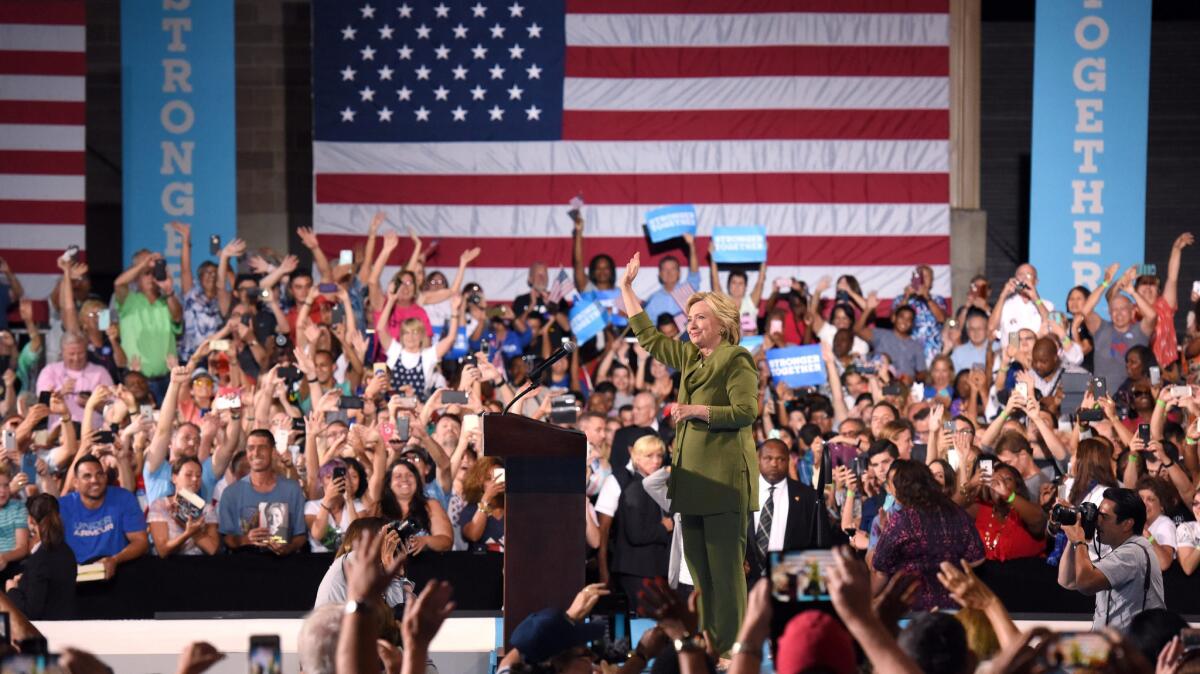Column: Hillary Clinton’s 3 big convention challenges

- Share via
Donald Trump made one part of Hillary Clinton’s job easier last week — by making the braggadocious claim that he alone can cure the nation’s ills, a boast that sounded more like a promise of one-man rule. But Clinton faces three other big challenges at her convention in Philadelphia this week, and they won’t be as easy as painting Trump as a dangerous blowhard.
Her first challenge is an old one: Can she make herself seem likable enough for Americans to want her in their living rooms?
“People think of her as competent,” Democratic pollster Peter D. Hart said recently, “but they don’t like her.” To win the general election, he said, Clinton needs to show that she’s actually “easygoing and likable — her friendships, her depth, all of those things.”
Which may not be as hard as it sounds. Bill Clinton changed voters’ perceptions in 1992 with a video that cast him as the “Man from Hope,” a poor boy who made it to the top through grit. In his wife’s case, a few warm anecdotes from friends and a few sweet videos of Grandma Hillary cradling a baby (the kind of videos that seem to be missing from the Trump collection) can go a long way.
Her second challenge is both more political and more difficult: In a year when most voters are deeply dissatisfied with the direction the country’s going, Clinton needs to cast herself as an agent of change.
The title she doesn’t want is the one GOP vice presidential nominee Mike Pence tried to pin on her last week: “secretary of the status quo.”
“There’s no question that there’s a penalty for trying for a third term,” Democratic pollster Mark Mellman told me, referring to the eight years the White House has been in his party’s hands. “And it’s hard for her to run as the most qualified person ever, but as an outsider too.”
David Axelrod, Obama’s chief strategist in 2008, said: “I don’t think she can plausibly campaign as the candidate of change because she has been a fixture in American politics for such a long time.”
Clinton’s answer has been to cast herself as an apostle of both continuity and change — continuity for parts of the Obama legacy that are popular (economic recovery, some aspects of Obamacare) and tweaks for parts that haven’t worked as well (middle incomes, other aspects of Obamacare and gridlock in Congress).
But even that may be tricky. She’s depending on millions of Obama voters to transfer their loyalties to her. She can’t sound as if she’s dismissing anything the president has done.
Finally, Clinton faces a problem that some of her aides acknowledge may be insoluble between now and November: her trust deficit.
Political opponents and conspiracy theorists have accused me of every crime in the book. None of it’s true. Never has been.
— Hillary Clinton
A CBS News Poll last month found that most voters don’t think Clinton is honest and trustworthy — although about the same percentage don’t think Trump is honest and trustworthy (62% for Clinton, 63% for Trump).
But in a telling contrast, the same poll found that while most voters give Trump credit for “saying what he believes,” only 33% said Clinton was forthright.
The Democratic nominee’s standoff with FBI Director James B. Comey — he decided not to prosecute her over her emails but said she had made many false statements en route to her nonindictment — reinforced her well-earned image as the Great Prevaricator. And she knows it.
“A lot of people tell pollsters they don’t trust me. I don’t like hearing that, and I’ve thought a lot about what’s behind it,” she said in Chicago last month.
Her answer? “Political opponents and conspiracy theorists have accused me of every crime in the book,” she said. “None of it’s true. Never has been.”
That dismissive attitude isn’t going to help.
“Those trust numbers are probably not going to get improved that much,” said David Plouffe, Obama’s campaign manager in 2008. “Every candidate has strengths and weaknesses.... You’re not going to have positives on everything.”
Axelrod agreed, saying, “I don’t think you can have a strategy to prove to skeptics that you’re trustworthy.”
To win, Clinton may have to ask voters to overlook her greatest flaw. And she may need to rely on people like Reed Benet, a Republican businessman from Michigan, who says he’s not happy with Trump and might vote for the Democrat.
“I’m coming to the conclusion that being a liar is not a disqualifying factor to be president of the United States,” he said. “And I feel terrible for saying that.”
Twitter: @DoyleMcManus
Follow the Opinion section on Twitter @latimesopinion and Facebook
More to Read
A cure for the common opinion
Get thought-provoking perspectives with our weekly newsletter.
You may occasionally receive promotional content from the Los Angeles Times.










